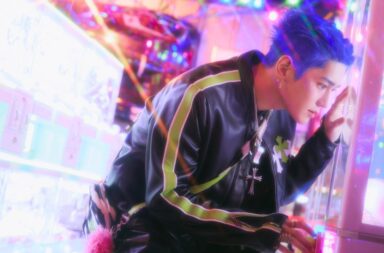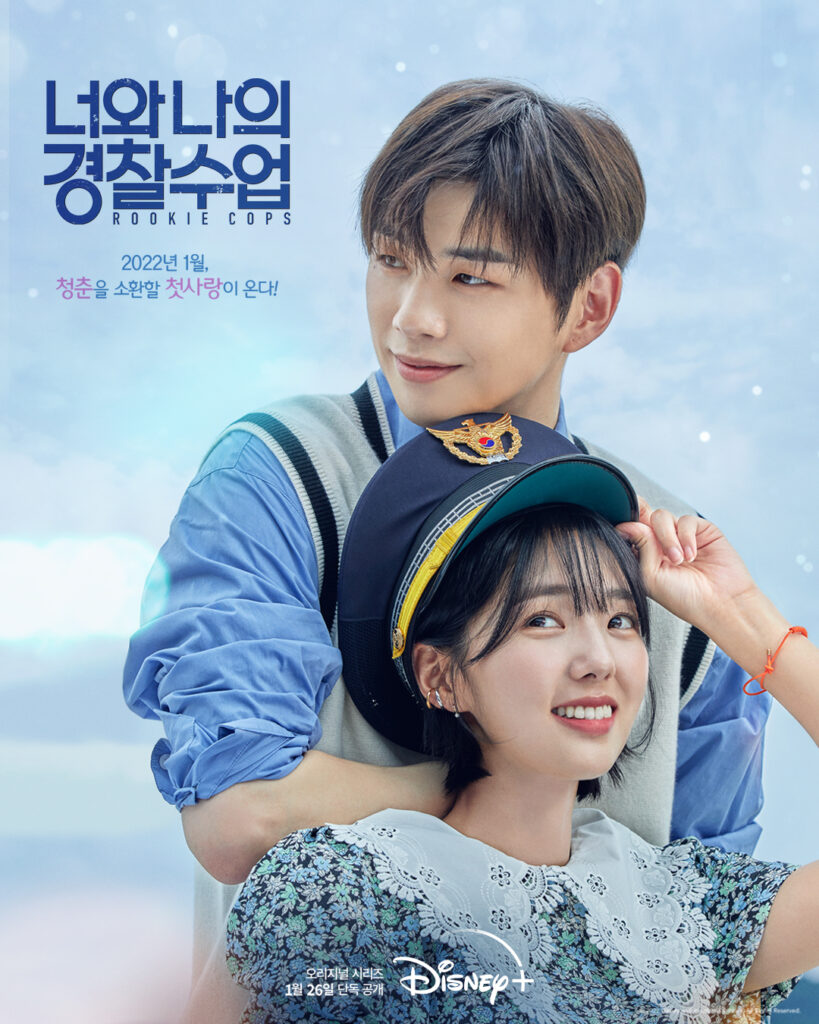
With the popularity of K-dramas continuing to rise – especially with the runaway success of Netflix’s Squid Game – it is unsurprising that the entertainment giant Disney is joining the fray with Rookie Cops.
This youth drama/cop thriller crossover could not have come at a better time. Having been the international distributor of JTBC’s controversial and disappointing Snowdrop, Rookie Cops marks a fresh (re)start in Disney’s foray into creating original K-drama content. It is the first show to come out of Disney’s five-year deal with Studio&New (Descandents of the Sun) is currently streaming on Disney+ as a Star Original.
Founded in Hong Kong and later purchased by Fox as part of Rupert Murdoch’s expansion into Asia (before Fox was sold to Disney), this can also count as Star’s first Korean show. In another first, Rookie Cops is also the stage for Kang Daniel’s acting debut, with the soloist and Wanna One centre taking on a lead role.
Considering the big names and expectations attached to the show, it is little surprise that Rookie Cops is one of the most-watched Disney+ shows in South Korea. Its continued success, however, is largely thanks to its fresh-faced cast, careful plot building and willingness to tackle themes like police corruption, elitism and equity – though there are some issues to address with how the show tackles them.
Note: Major spoilers for Episodes 1 to 8 of Rookie Cops follow.
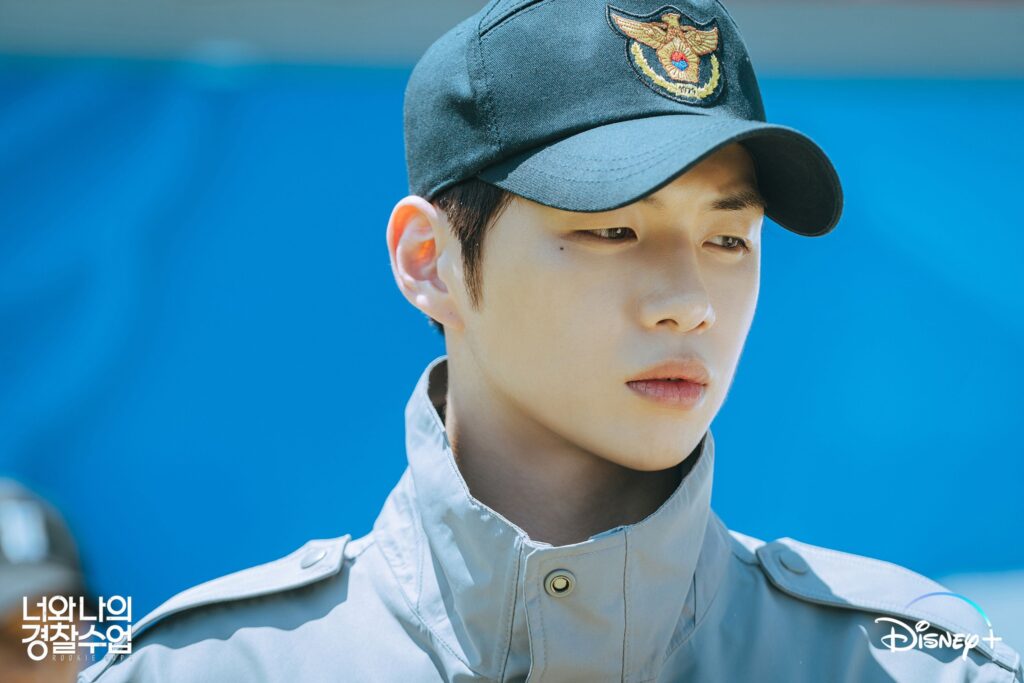
The first half of Rookie Cops takes an ensemble cast approach to show us how the different students from around the country settle into their life at the Korean National Police University (KNPU) in their quest to become elite police officers.
Though he has his green moments, Kang manages to blend in with the other young actors. Playing a (mostly) unflappable character like star pupil and low-key legacy admission Wi Seung-hyun also helps. However, as the episodes go on, there is some improvement–Kang also opens up more emotionally as his character hurtles towards Rookie Cops’ central romance. A special highlight is when Seung-hyun confides in fellow KNPU recruit Eun-kang (Chae Soo-bin, A Piece of Your Mind) in episode seven.
To be fair to Kang, part of the reason for this may also be the show’s pacing. Rookie Cops spends the first half of its run establishing characters and hinting at the endgame: the murder of an officer just a week shy of his graduation from KNPU in an off-the-books drugs investigation gone horribly wrong.
The flashbacks, with their gritty filter and black bars, jar almost painfully with the bright hues and playful graphics that surround the KNPU students, especially in the first couple of episodes. Thankfully, the show takes on a more naturalistic tone as it progresses, matching the mood of the students as they settle into college life.

Chae Soo-bin’s portrayal of the strong-willed and fair-minded Go Eun-kang is the highlight of these first eight episodes. It is her journey we mainly follow: her family life as a much loved but often neglected scapegoat; speaking out against the needlessly cruel orientation program; the inner crisis when her entire reason for attending KNPU comes crashing down around her ears; her beginning to mature and come of age as she gains more confidence.
At each point, Chae ably brings us into Eun-kang’s inner world and guides us through her character’s growth. The key to this is Seung-hyun’s support throughout her time at KNPU. Though starting off on the wrong foot in the outside world, Seung-hyun eventually comes through as an ally for Eun-kang in challenging the Cheongram Education’s cruelty. (In real life, KNPU allegedly did reform their orientation programme).
This pattern of Seung-hyun giving advice and support to Eun-kang at just the right moment continues as Eun-kang encounters more challenges. He is never overbearing, content to let Eun-kang digest and take on his thoughts at her own pace. Just as she cracks his stoic demeanour, he nurtures her strong spirit.
This dynamic flies in the face of KNPU’s apparent ethos, whereby recruits need to harden up and follow orders without question. This is meant to make the corps work together more effectively, but Eun-kang and Seung-hyun demonstrate that respecting each individual’s humanity can also build a strong community.
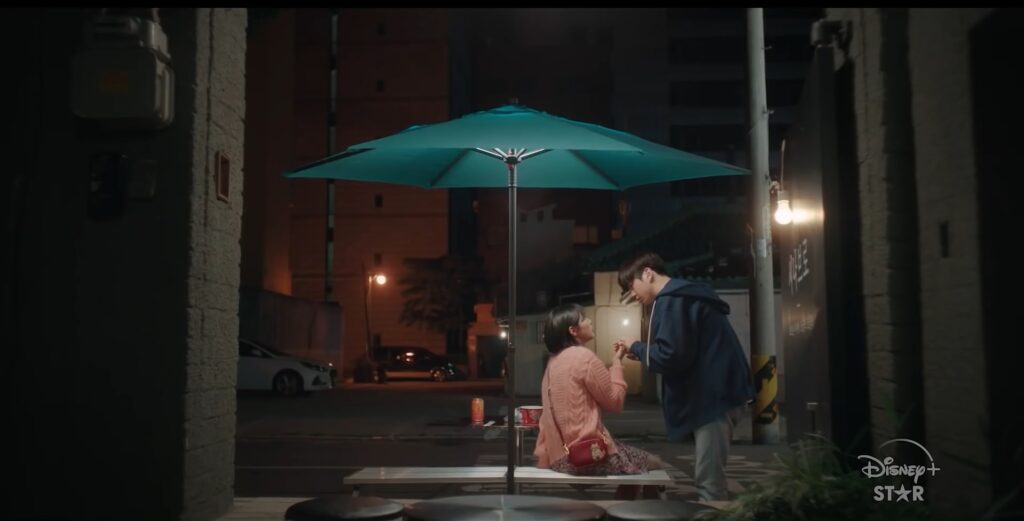
Rookie Cops also attempts to tackles the very existence of KNPU itself. With its rigorous selection procedure and high expectations, KNPU produces elite police officers who graduate directly to a higher rank, compared to officers who graduate from a police academy and have to work their way to more senior positions. The benefits of such a prestigious (and taxpayer-funded) education are clear. Even Eun-kang notices how her own family treats her better since entering the university.
This prestige rings hollow, though, as we not only see the pressure this elitism places on KNPU students but also glimpses into the divide it creates within the wider police force. Professor Cha Yoo-gon (Kim Sang-ho, My Name) is growing increasingly disillusioned with his alma mater, while detective Kang Nam-gi (Hyun Woo-sung, Love Scene Number) puts his mentee Gi Han-na’s (Park Yoo-na, Hotel Del Luna) future at risk in service of his vendetta against KNPU.
As interesting to see how Rookie Cops aims to address these issues within the plot, I won’t hold my breath for any proper accountability on part of KNPU when two clear opportunities to address brutality have already been missed.
The first is the lack of consequences for the senior students carrying out the old orientation programme. This could be argued as them simply carrying out orders given and that the institution itself is ultimately responsible. The seniors in question may have been counselled offscreen, but Han-na’s victimisation is all but swept under the rug with the rest of the Cheongram Education. The closest she gets to an apology is in episode eight, when at the annual sports carnival she drags herself and an injured Eun-kang across the finish line in the Women’s Triathlon.
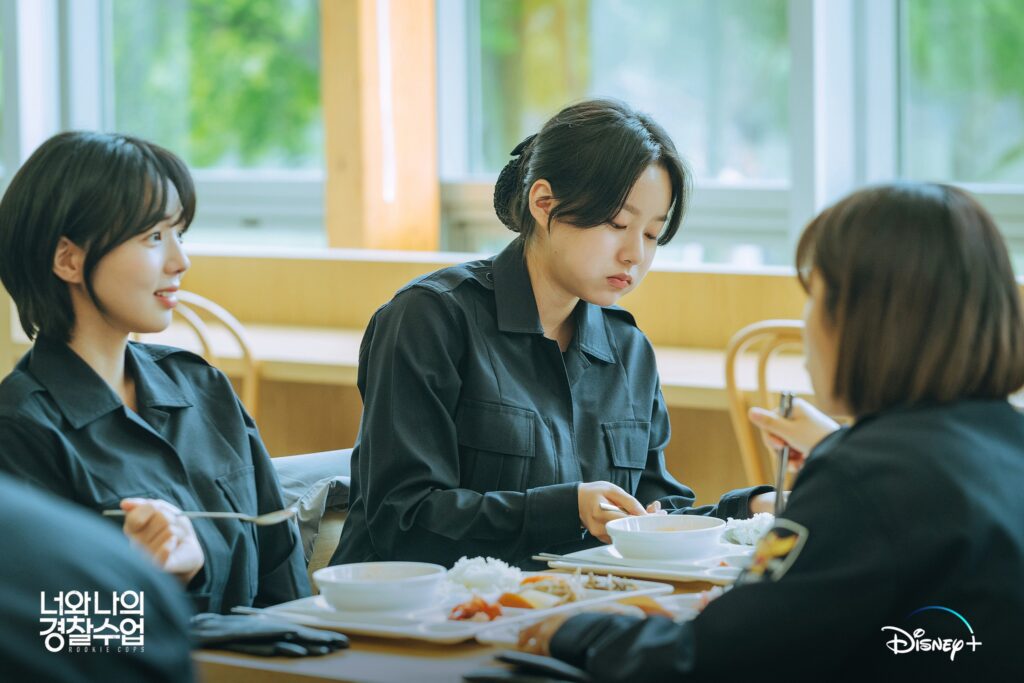
As everyone checks in on Eun-kang, head trainer Uhm Hyuk (Lee Joon-woo, Sweet Home) congratulates her for finishing the course and not leaving her teammate behind. This does in part lead to Han-na, ostracised for both her cold demeanour and escaping expulsion despite breaking school rules, being properly accepted by the student body. The exchange acts as a proxy, achieving the same restorative outcome that an apology might without having to actually acknowledge any wrongdoing.
The other example has an even less satisfying conclusion. When Seung-hyun witnesses a billiards hall worker being harassed and abused, he attempts to intervene and call the actual police. His roommate Kim Tak (Lee Shin-young, Crash Landing On You), unfortunately, goes for his usual blunt approach and starts punching right back when one of the bullies becomes aggressive. The resulting brawl concludes with Tak repeatedly punching an unresponsive bully in the face.
It is horrifying to watch and I thought the show knew that too, with its focus on that action. However, this turned out to simply be the foreshadowing of a corrupt student recording the incident for blackmail purposes.
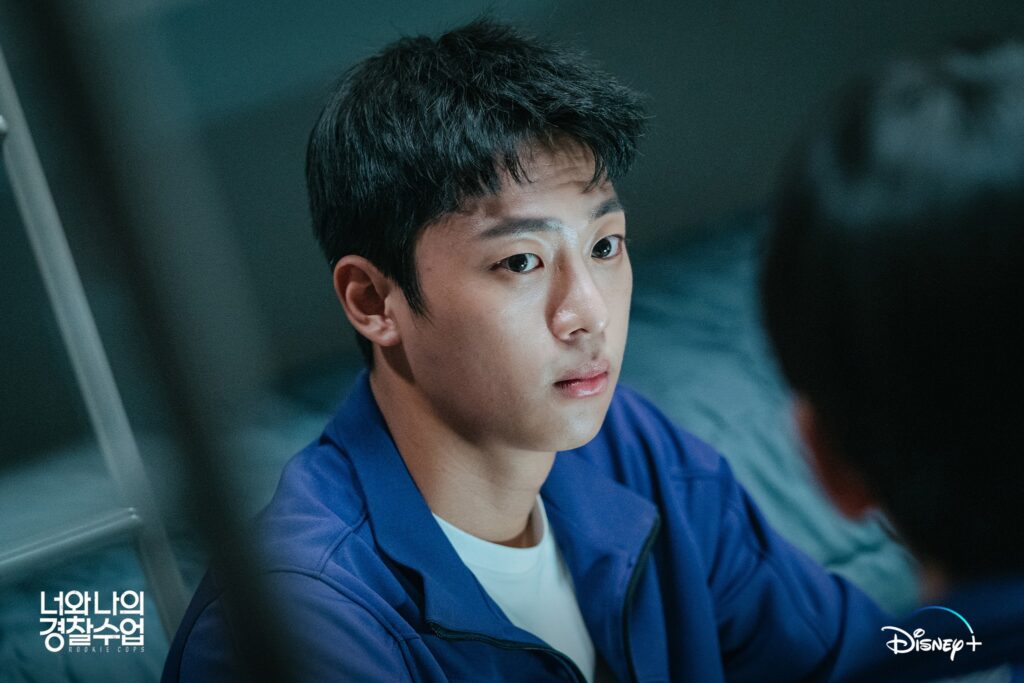
Any conversation about Tak’s actions mainly revolves around how the consequences will be worse for him if the university learns about the fight…which it should be. Seung-hyun even goes as far as to say that cops should be allowed to protect themselves. In the context of the global conversation about police brutality, this attitude towards Tak’s violence is shocking.
In South Korea, there is actually a call from some quarters for more police intervention following numerous incidents over the years, the most recent involving an officer leaving the scene after witnessing a stabbing to get back-up from her police partner downstairs. That said, there is a middle ground between not intervening when injustice and crime occur and continuing to punch a person – criminal or not – after they have stopped fighting back. Whatever your thoughts on how much force the police should use, it is clear that in Tak’s case he went too far.
When his actions do come to light, Tak avoids punishment and even the counsel he receives from Professor Cha is quickly overtaken as the scene’s focus instead becomes the revelation that Tak is the younger brother of the young KNPU grad and killed in the show’s opening scene.
I have no doubt that Tak will have to answer for his lack of consideration of others. I just don’t like that it will likely come via a cutesy love triangle or friendship drama when it could have already happened in such a serious circumstance.
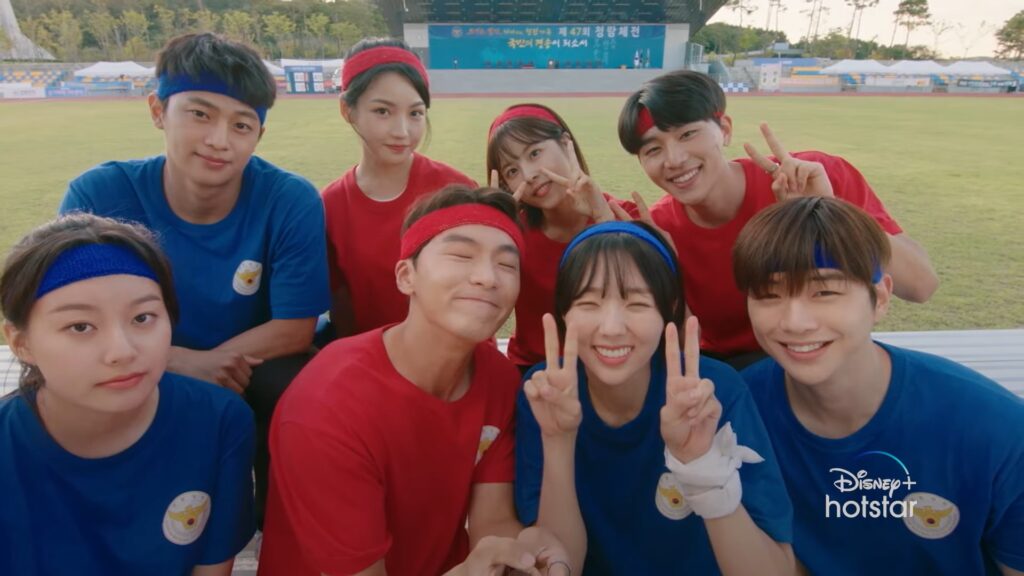
As we head into the latter half of Rookie Cops, I remain optimistic for a finely woven story that offers opportunities for further introspection. Hopefully, the drama will probe farther than it has thus far and show some actual accountability being taken.
(FlixPatrol, Reuters, Variety. Images via Disney+)


